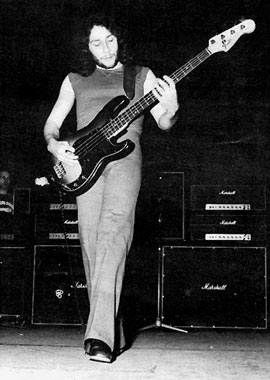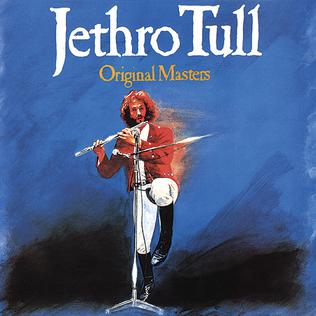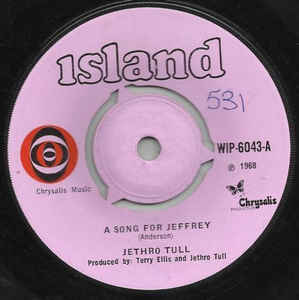
Jethro Tull are a British rock band formed in Luton, England, in 1967. Initially playing blues rock and jazz fusion, the band soon incorporated elements of English folk, hard rock, and classical music, forging a signature progressive rock sound. The group’s bandleader, founder, primary composer, and only constant member is Ian Anderson, a multi-instrumentalist who mainly plays flute and acoustic guitar, and is also the lead vocalist. The group has featured a succession of musicians throughout the decades, including significant contributors such as electric guitarist Martin Barre, keyboardists John Evan, Dee Palmer, Peter-John Vettese, and Andrew Giddings, drummers Clive Bunker, Barrie "Barriemore" Barlow, and Doane Perry, and bassists Glenn Cornick, Jeffrey Hammond, John Glascock, Dave Pegg, and Jonathan Noyce.

Too Old to Rock 'n' Roll: Too Young to Die! is the ninth studio album released by British band Jethro Tull, recorded in December 1975 and released in 1976. It is the first album to include bassist John Glascock who also contributes with backing vocals. Too Old to Rock 'n' Roll: Too Young to Die! is the last Jethro Tull concept album, which follows the story of Ray Lomas, an ageing rocker who finds fame with the changes of musical trends. It was Jethro Tull's only album of the 1970s not to achieve Gold certification.

John Evan is a British musician and composer. He is best known for having played keyboards for Jethro Tull from April 1970 to June 1980. Evans' father was headmaster at a Derbyshire village school and his mother was a local concert pianist and piano teacher. The family moved to Blackpool, Lancashire in October 1949. Evans was educated at Blackpool Grammar School, where he met Ian Anderson and Jeffrey Hammond, and Chelsea College, now King's College London.
"Aqualung" is a song by the British progressive rock band Jethro Tull, and the title track from their Aqualung (1971) album. The song was written by the band's frontman, Ian Anderson, and his then-wife Jennie Franks.

A Little Light Music (1992) is a Jethro Tull live album. All songs were recorded during a semi-acoustic European tour in May 1992. Greek singer George Dalaras participates and sings a duet with Ian Anderson in the song "John Barleycorn" on the Italian version of the album only, the worldwide version has a re-recorded vocal by Ian Anderson.

Slipstream is a video by Jethro Tull, recorded during the 1980 A tour, released for the first time in 1981. It was originally released on VHS, Capacitance Electronic Disc, and laserdisc, and was released as a (bootleg) DVD in Brazil in 2003. It is also included in the (2004) bonus DVD edition of A. This bonus DVD was the only official release on DVD until it was released as part of the 40th anniversary box set of A in April 2021.

John Glascock was a British musician. He was the bassist and occasional lead vocalist of the rock band Carmen from 1972 to 1975; and the bass guitarist for progressive rock band Jethro Tull from 1976 until his death in 1979. Glascock died at the age of 28 as a result of a congenital heart valve defect, which was worsened by an infection caused by an abscessed tooth.

Original Masters is a greatest hits album by Jethro Tull released under Chrysalis Records in 1985. It was the band's third such effort, the first two being M.U. - The Best of Jethro Tull and Repeat - The Best of Jethro Tull - Vol II. Although the compilation was released in 1985, it does not include material released after 1977.

"Locomotive Breath" is a song by British progressive rock band Jethro Tull from their 1971 album, Aqualung.
"Cross-Eyed Mary" is a song by the British progressive rock band Jethro Tull from their album Aqualung (1971).

"Living in the Past" is a song by British progressive rock group Jethro Tull. It is one of the band's best-known songs, and it is notable for being written in the unusual 5
4 time signature, though it is properly felt as a very distinct 6
8 + 2
4 syncopated rhythm. The 5
4 time signature is quickly noted from the beginning rhythmic bass pattern.
Dee Palmer is an English composer, arranger, and keyboardist best known for having been a member of the progressive rock group Jethro Tull from 1976 to 1980.
"Mother Goose" is a song by the British progressive rock band Jethro Tull. It is the fourth track from their album Aqualung which was released in 1971.

Live at Madison Square Garden 1978 is a concert video and an album by British rock band Jethro Tull, released in 2009. It was recorded on 9 October 1978 at Madison Square Garden in New York City.

"A Song for Jeffrey" is a song recorded by the English progressive rock band Jethro Tull, released as their second single in the U.K. However, in the U.S., it was the B-side to "Love Story". It is written in honour of Ian Anderson's friend and future Jethro Tull bassist Jeffrey Hammond. Another version of the song was recorded for play on BBC radio.

"Songs from the Wood" is the title track off of English rock band Jethro Tull's album Songs from the Wood. Written by frontman Ian Anderson, it features a folk-rock style that characterizes the Songs from the Wood album.

"Skating Away on the Thin Ice of the New Day" is a song by British progressive rock band Jethro Tull. It was released on their album War Child in 1974. Written as a comment on global cooling for the band's aborted "Chateau D'isaster" album, the song was reworked in 1974 for War Child.
"Heavy Horses" is a song written by Ian Anderson and performed by his band Jethro Tull. The song was released on the 1978 album of the same name. Written as a tribute to horses, the song features folk rock elements that rebelled against the musical trends of the period.
"Dun Ringill" is a song written by Ian Anderson and performed by his band Jethro Tull. The song was released on the group's 1979 album Stormwatch. Written as a tribute to the fort of the same name, the song features folk rock elements that rebelled against the musical trends of the period.

"Teacher" is a song by the British rock band Jethro Tull, first released as the B-side to the January 1970 single "The Witch's Promise", on the Chrysalis label. Written by the band's frontman Ian Anderson, the song is a comment on the corruption of self-styled gurus who used their followers for their own gain.














